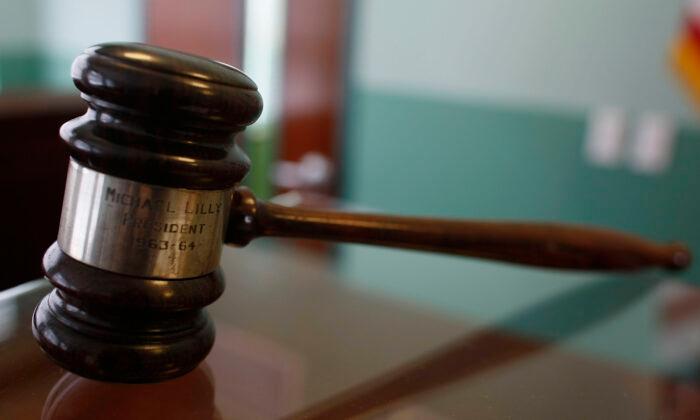In the run-up to the Ontario law society’s election in April, a group of lawyers is taking a stand against what they say is the regulator’s imposition of “woke ideology” on its members in the form of equity and diversity initiatives.
“The legal profession … is supposed to be the last line of defence against state overreach and tyranny,” lawyer Lisa Bildy of London, Ontario, told The Epoch Times. “[In the long term], the judiciary will also absorb this ethos and such that the prospect of coming before a neutral arbiter in the courts becomes less sure.”
Before the last LSO bencher election, in 2019, these contests were fairly ho-hum.
But the regulator passed a motion in 2016 to require all lawyers—as a condition of being allowed to practise—to sign a diversity and equity statement of principles (SOP). For the first time in bencher election history, a large slate of lawyers ran together in 2019 on a contentious political issue.
They called themselves StopSOP. And they won, taking 22 of the 40 seats.
With bencher elections taking place every four years, the next is due this April, and for the first time ever it now has two opposing groups—the “other” side was fragmented in 2019 but has since formed into a unified Good Governance Coalition.
Bigger Than the SOP
This year’s iteration of StopSOP is calling itself FullStop. “Our goals are more broadly to rid the Law Society of its politicization,” Bildy said.The Good Governance Coalition has said it will not bring back the SOP. But FullStop candidates say it’s no longer only about SOP.
Ottawa lawyer Stéphane Sérafin, a FullStop candidate, told The Epoch Times via email that Good Governance candidates forcefully opposed the repeal of the SOP, showing their commitment to it.
They could bring it back in a different form, he said, but even if they don’t, the LSO “still has the power to discipline members for failing to comply with woke ideology.”
Sérafin believes Good Governance candidates can’t be trusted with that power.
Candidates Running Against FullStop
The Epoch Times reached out to many of the 45 Good Governance candidates but none accepted a request to be interviewed.One of the group’s incumbent candidates, Atrisha Lewis, sent a statement saying Good Governance candidates “will take our fiduciary responsibility seriously. That’s what a $100 million organization responsible for regulating lawyers and paralegals in the public interest requires.”
She said the StopSOP slate was successful partly because opposition votes were split among over 100 non-slate candidates. That’s why the Good Governance Coalition formed this year, to avoid vote-splitting.
“I don’t believe political parties belong at Convocation. I want to work with colleagues who are leaders in the bar and whom I respect. There are many important issues to be debated,” Lewis wrote.
Another Good Governance candidate, Rebecca Duran, said via email, “We have different opinions on different matters as a result of our experiences. That being said, we are all committed to discharging the bencher role in accordance with fiduciary duties. None of us will be resurrecting the Statement of Principles.”
Pardy, a law professor at Queen’s University, LSO member, and part of the FullStop team, wrote that the regulator “is set on establishing ideological requirements to maintain our licences and livelihoods.”
LSO Equity Initiatives
The Statement of Principles was number three on a list of 13 items the Law Society enacted in 2016.Bildy said that “even though the big governance slate says they are not bringing back the SOP, they have not disavowed the many other politicizing initiatives that were passed at the same time.” (“Big” governance is the name FullStop uses to refer to Good Governance.)
Toronto lawyer Alexander Boissonneau-Lehner, who is a member of the electorate, not a candidate, was among those who signed the SOP reluctantly. “I don’t want any problems. I'll check the box,” was his approach, he said. “I personally believe that diversity is a good thing, but I did think it was kind of untoward that the Law Society would require me to click that box, to commit to that. I thought that was a little much.”
He told The Epoch Times he’s worried that “our Convocation is infused now with ideological politics on both sides.”
“I don’t think it’s in the public interest for Convocation to engage in political debates, and I think they should return to the original mandate, which is just regulate the profession in the public interest,” he said.
Sérafin, who is a professor at a Canadian law school, said that even if the LSO were to remain free of these ideological debates, the law schools are not free of those debates and will influence the next generation of lawyers. He said his law school has adopted its own version of the SOP, “which remains in effect and is supposed to bind law students.”
“The problem of ideological capture is in many ways worse in law schools than at the Law Society. Much of it is because there is no equivalent group to FullStop that can push back,” he said.
Bildy agrees.
“Our law schools are also becoming increasingly focused on social justice and equity notions, rather than classical liberal and foundational tenets of (blind) justice and equality,” she said, adding that students are often not exposed to competing ideas.
“Critical thinking in universities generally is being punished rather than developed as a necessary skill.”





